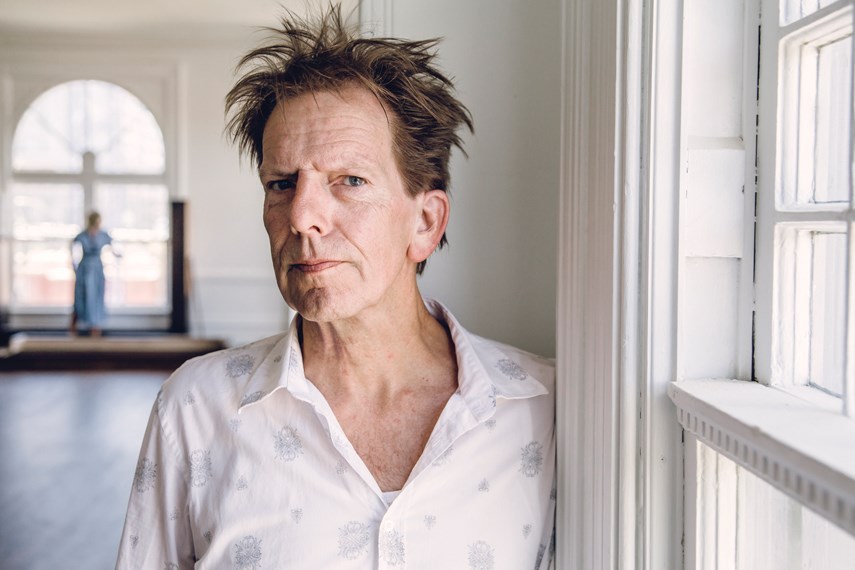Â鶹´«Ă˝Ół»Folk Music Festival presents .
The sound of the SkyTrain hums in the background as Art Bergmann steps out of his practice space near Commercial Drive to make a call.
When he performs at the Â鶹´«Ă˝Ół»Folk Music Festival this weekend, he’ll have been in the city for almost a week, returning to the hometown where in the late 1970s he became a figurehead in Canada’s punk rock scene, mainly as the lead singer of genre stalwarts, the Young Canadians.
In his prime, however, Bergmann was perhaps better known for his promising, eclectic solo career that was derailed in the late ’90s after he entered a period of self-imposed exile due to health issues and general dissatisfaction with the music industry.
For the last 10 or so years, Bergmann, now 65, has been living on what he describes as a dilapidated farm just 20 minutes north of Calgary.
“I disappeared,” Bergmann says, upon calling the North Shore News. “I did the odd show. … I lost interest.”
But a few years ago his musical verve was piqued again and he triumphantly returned from the underground, bringing with him a mellower musical vibe that still retained the searing lyrical chops of his previous records. Life on the farm hadn’t softened Bergmann one bit – in fact he appeared more fired up about the state of the world than ever before.
“There’s enough people making too much noise now. I just can’t bear it anymore, all the racket in the world,” he says when asked if he still carried affinity for the hard-rocking sound of his past. “My few lyrics that get out there, I don’t want them to be overwhelmed by a kick drum or something. … I want to make timeless music.”
In 2016 Bergmann released the crowd-funded album The Apostate, his first full-length release in almost two decades.
He hasn’t toured extensively on the new record, describing touring as “a big animal,” but the album was released to rave reviews largely due to Bergmann’s insightful lyrics on topics as diverse as climate change, religious fundamentalism, and abuses of government power.
After initially calling it quits on the music industry some two decades earlier, Bergmann is candid when he says he didn’t write any new material or play music, save for the odd show, for the better part of that time. He occupied himself in other ways.
“I was researching, reading a lot. Reading a lot about the human condition. Reading Marxist history,” he says, before imploring: “You have to stand up to the evil forces that keep winning. I’m sure most of the people of the world are good people and they’re being railroaded by these criminals of capitalism.”
Bergmann’s list of gripes is long, and for each one he has something honest and intelligent to say. He bemoans mankind’s capacity for cruelty when it comes to denying refugees safe harbour; he gets animated when talking about creatures of the sea that can’t even be consumed because the ocean is full of plastic; he’s continually angered that “people aren’t held responsible for their criminality”; and when describing his farm in Alberta, he says much of the area has been affected by the rampant destruction of farmland that’s been given over to single-family residences and brick and mortar.
“The dark forces of beige are winning again,” he says.
But the decent forces that brought Bergmann back to music are also worth noting. In 2013 he was invited to play at the birthday party for Tony Dekker of the Toronto-based indie band Great Lake Swimmers that would end up bringing him back into the fold.
“He was a big fan,” Bergmann says, noting that Dekker introduced him to his record label. “He got me going again, in 2013, after I played one show again in Â鶹´«Ă˝Ół»and sold it out. It was pretty inspiring.”
And after sitting on a wealth of knowledge from a previous decade spent poring through tomes and analyzing the state of the world, Bergmann starting writing again, putting out the Songs for the Underclass EP in 2014.
“It kind of started it all off again for me,” he says. “I’ve kept writing since then. I’m debuting two brand new songs this weekend that aren’t even recorded.”
It was the bureaucracy of the Canadian music industry that initially soured Bergmann on continuing with his career in the late ’90s, as moving into the mainstream didn’t always produce fruitful or creatively satisfying results for the independently minded rocker.
“I should have stayed indie from the word go and I think I would have been a much happier person. I got locked into doing the Canadian Rock Incorporated-thing and that was f!&@*g nowhere,” he says.
In the second act of Bergmann’s career he’s looking to play more shows and get his music out there to more people, intent to not let companies and agencies run his life this time.
Musically he’ll continue to do things his own way, such as on The Apostate which takes its musical cues from eastern folk music and country. “I’ve been inspired by lots of different music over the years,” he says.
And while the punk esthetic may no longer be part of Bergmann’s musical bag of tricks, he still draws inspiration from the ethos and work ethic of the genre.
“Do what your artistic-self demands,” he imparts. “Don’t be a clone.”


